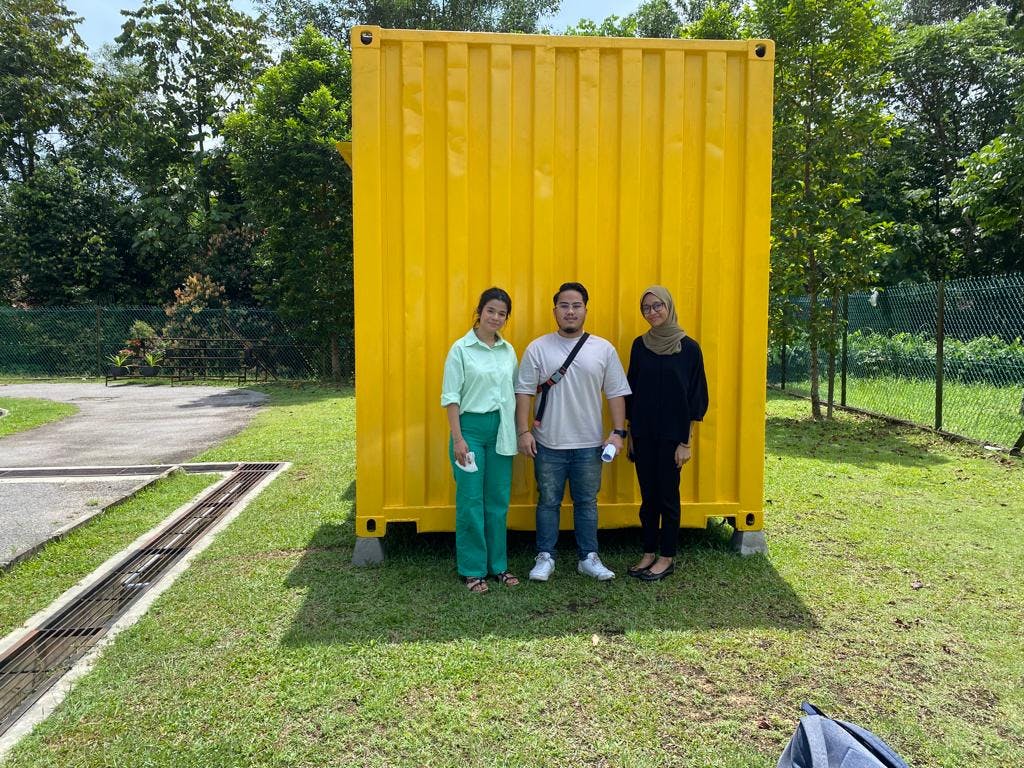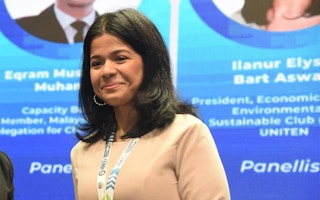Young leaders around the world are becoming more active and vocal in the energy space. In Malaysia, where one of the biggest hurdles for the lack of participation from youth lie in the inherent complexity and technical nature of energy concepts and policies, new platforms are emerging to help people simplify the seemingly difficult topic and lower the barriers for getting involved.
To continue reading, subscribe to Eco‑Business.
There's something for everyone. We offer a range of subscription plans.
- Access our stories and receive our Insights Weekly newsletter with the free EB Member plan.
- Unlock unlimited access to our content and archive with EB Circle.
- Publish your content with EB Premium.
For example, at Universiti Tenaga Nasional or UNITEN, a Selangor-based private university wholly owned by Malaysian multinational electricity company Tenaga Nasional, members of the university student’s club 3ESC (short for Economics, Energy, Environment and Sustainable Club) have been helping to run a programme to provide children with access and exposure to concepts of energy efficiency and renewables, with the hope of starting them young.
Training sessions are conducted every Sunday at STEMbox, a one-tonne container that has been repurposed into a learning hub and green construction showcase. The place is also equipped with computers with 3D design software. Newly-elected president of 3ESC Ilanur Elyssa Bart tells Eco-Business that by attending the STEMbox sessions, underprivileged children in the community have access to learning resources that tend to be ‘prohibitively expensive’, and can learn more about science, technology, engineering and mathematics (STEM).
“We come up with sustainability modules and teach them about energy efficiency, renewable energy – concepts that we learnt in class. We also play games together and encourage them to speak up,” said Elyssa.
Born in Shah Alam, the capital of the Malaysian state of Selangor, Elyssa has been interested in sustainability since high school, and the enthusiasim has helped her decide to pursue a Bachelors degree in energy economics. With Malaysia pledging to work towards becoming a carbon neutral nation by 2050 at the earliest, Elyssa believes that there will be demand for green-collar professionals familiar with energy and environment policies, and that she will be able to make a contribution.
“It is also one of the best decisions I have made, because I truly love the topic. It seems easy to excel because I am passionate about it,” she said.

Elyssa (left) and fellow 3ESC members, standing in front of a container turned into a learning centre, during their first training session for the STEMbox project. Image: Ilanur Elyssa Bart
As a youth sustainability advocate, Elyssa speaks up for the causes that she supports. At this year’s International Sustainable Energy Summit held in August, she represented UNITEN and shared with the audience about her journey in empowering young people to become environmentally conscious, and her belief that youth can play an important role in the country’s energy transition.
Just this month, Elyssa was also elected director of environment at MRA Siswa, the youth-led wing of humanitarian organisation Malaysian Relief Agency. Her responsibilities include helping the environment department create programmes to educate the public about the value of environmental conservation, and her team is currently working on a mangrove planting project, as well as “Code Green”, a campaign to raise awareness about the impacts of river pollution.
In this interview with Eco-Business, Elyssa shares about her aspirations to join academia, her sustainability role model and how her dad sparked her passion in sustainability.
How did your interest in sustainability begin?
It is an amusing story. When I was 15 or 16 years old, I was in a car with my dad and he started talking about climate change. I listened to him share about how climate change was a big concern to him and he was really passionate about it. This was back in 2015, when climate change wasn’t that big in Malaysia. It made me think that I really wanted to learn more and have a conversation with my dad about the topic. When I got home, I started reading about climate change. Before that, I thought climate change and sustainability were difficult to understand. But when I read more, I realised these are interesting topics that intersect with energy, governance, and had many aspects to them, such as the social aspects and so on. That was when my interest in sustainability began.
“
I find the idea of being able to contribute to the existing pool of knowledge to be really interesting. It might not be glamorous, but to be able to contribute to knowledge would probably make me feel somewhat like a superhero.
Who are your sustainability role models?
My role models change frequently because every time I meet somebody new whom I can relate to, he or she becomes my new role model! My most recent role model is Ken Koyama, senior managing director and chief economist at the Institute of Energy Economics Japan (IEEJ). I listened to his webinars and met him when he came to UNITEN to give a talk. He is amazing because he can take something very complicated and make it simple to understand. For example, within two hours of listening to him, I understood how the Russia-Ukraine conflict affected energy security. Previously, it was hard for me to grasp. He contributed to Japan’s energy policy and I look up to him for that. I want to specialise in energy too and really hope to contribute to my country.
I also look up to my lecturers in my faculty (the College of Energy Economics and Social Sciences, UNITEN) because they are extremely knowledgeable and passionate about the subjects they teach. They give amazing energy in class.
What advice do you have for other students in sustainability?
I would tell them to find their niche and figure out what they really like to do. For example, within the broader topic of sustainability, I am passionate about energy. To me, it is interesting to see how energy is the cause of a lot of issues around the world.
Also, when you have passion for something, it makes a difference. You might go beyond contributing only to the institution that you belong to, but also to your country, when you come up with solutions that are beneficial to a wider public. They say if you love what you are doing, you won’t feel like it’s work, and I believe that is true.
Which companies do you admire for their approach to sustainability and why?
One company which I think has a unique sustainability strategy is [food and beverage conglomerate] Fraser & Neave (F&N). I was reading their sustainability report and saw that they reduced the sugar usage in their drinks by 31 per cent. I never thought of reducing sugar as part of sustainability. I always thought it had more to do with going on a diet and being healthy, but now I realise that good health is a part of social sustainability. It is an interesting way to think about sustainability.
Another company I admire for its sustainability efforts is Hygr. It is a small Malaysian brand that sells cosmetics like lip balms and deodorants made with natural ingredients. The products are also affordable. There is this misconception that eco-friendly products are expensive, but Hygr’s products are accessible for most people.
What’s your dream job?
For the longest time, I wanted to join a multinational company. I did my internship with global professional services firm KPMG where I was attached to the sustainability services department. It was interesting but I don’t think consultancy is for me.
I know exactly what I want to do now. I want to get into academia and become a lecturer in the energy field. I want to teach and do research. I talked to my mom about it and she said maybe teaching suits me because I like to talk and I love reading.
I find the idea of being able to contribute to the existing pool of knowledge to be really interesting. It might not be glamorous,but to be able to contribute to knowledge would probably make me feel somewhat like a superhero. I think it would make me really happy.





















